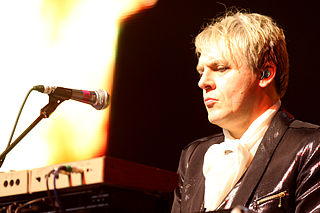A Quote by Neale Donald Walsch
Science and medicine and technology have all produced the breathtaking advances with which they have gifted the human race, only because they have been willing to do what religion has consistently, staunchly, and stubbornly refused to do: question the prior assumption.
Related Quotes
The difficulty in today's world is our technology and science has outrun our theological advances. The reason for that is in technology and science, we have had the courage to ask the single question that theology has been afraid to ask: "Is it possible that there's something I don't know about this, the knowing of which would change everything?"
By a peculiar prerogative, not only each individual is making daily advances in the sciences, and may make advances in morality (which is the science, by way of eminence, of living well and being happy), but all mankind together is making a continual progress in proportion as the universe grows older. So that the whole human race, during the course of so many ages, may be considered as one man who never ceases to live and learn.
[Science fiction is] that class of prose narrative treating of a situation that could not arise in the world we know, but which is hypothesised on the basis of some innovation in science or technology, or pseudo-science or pseudo-technology, whether human or extra-terrestrial in origin. It is distinguished from pure fantasy by its need to achieve verisimilitude and win the 'willing suspension of disbelief' through scientific plausibility.
Medicine is the science by which we learn the various states of the human body in health and when not in health, and the means by which health is likely to be lost and, when lost, is likely to be restored back to health. In other words, it is the art whereby health is conserved and the art whereby it is restored after being lost. While some divide medicine into a theoretical and a practical [applied] science, others may assume that it is only theoretical because they see it as a pure science. But, in truth, every science has both a theoretical and a practical side.
In vain do science and philosophy pose as the arbiters of the human mind, of which they are in fact only the servants. Religion has provided a conception of life, and science travels in the beaten path. Religion reveals the meaning of life, and science only applies this meaning to the course of circumstances.
The life and soul of science is its practical application, and just as the great advances in mathematics have been made through the desire of discovering the solution of problems which were of a highly practical kind in mathematical science, so in physical science many of the greatest advances that have been made from the beginning of the world to the present time have been made in the earnest desire to turn the knowledge of the properties of matter to some purpose useful to mankind.
I would teach the world that science is the best way to understand the world and that for any set of observations, there is only one correct explanation. Also, science is value-free, as it explains the world as it is. Ethical issues arise only when science is applied to technology - from medicine to industry.
I think films are perishable, because they depend too much on technology, which advances too quickly and the films become old-fashioned, antiques. What I hope for is that technology advances to the point that films in the future will depend on a little pill which you take; then you sit in the dark, and from your eyes you project the film you want to see on a blank wall.



































